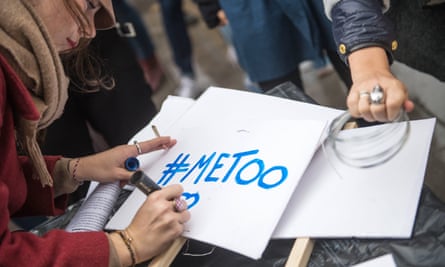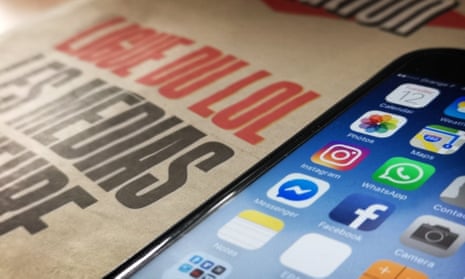Florence Desruol was a freelance consultant living in Lyon when the attacks began in 2009. Hundreds of abusive messages were posted online, a false account was created in her name, and her head was Photoshopped on to pornograph images and published.
“I was called a slut, a whore, my face was grafted on to a picture of a naked woman having sex – it was all designed to humiliate and silence me,” she said.
What stood out was that the abuse was coming from a group of young, influential journalists in Paris, many at the heart of prominent newsrooms and websites. About 30 men, several of whom were working for progressive or left-leaning media, had started a “boys’ club” called the Ligue du Lol (League of Lol).
They are accused of running online harassment campaigns against feminists, female journalists, writers of colour and gay people – often using false accounts to spread racist and sexist abuse and rape-threats. The French media were thrown into crisis this week when the full scale of abuse began to emerge. It has been deemed French media’s #MeToo moment.
“They were the Twitter stars of the moment, they seemed untouchable, but I took them on,” Desruol told the Guardian. She contacted one senior website editor in 2010 to complain about his staff, but the abuse continued. She went to the police, who struggled to understand and instead suggested she quit social media. She drafted a letter to editors of major publications to alert them to the actions of their staff. But before it was sent, the draft was leaked online and the abuse got worse.
“At that point I had a burnout. I couldn’t open my computer, I couldn’t use my phone except to answer calls,” she said. She went offline for a while, returning later to work on Nicolas Sarkozy’s online campaign for the 2012 presidential race. “My harassers would message me saying ‘Flo, Flo, have you taken your pills’ implying I had been in a psychiatric hospital. By that stage they were running a kind of online harassment operation against many people on an industrial scale.”
Eight high-profile journalists and public relations executives who belonged to the group were this week suspended or stepped down amid accusations they targeted feminists and minority writers online. Many issued public apologies while hinting it had been just banter. The group’s founder, Vincent Glad, was suspended by leftwing daily Libération, whose own fact-checking unit broke the story. It also emerged that the websites Huffington Post and Vice had fired several staff over separate closed workplace messaging groups where men allegedly exchanged sexist and racist comments about female colleagues.
Amid the outcry, French government ministers announced new laws to make social media platforms pull hateful posts. But many young female journalists said that the abuse was not only taking place online but in real life too, and that it went beyond the League of Lol’s peak activity between 2010 and 2013.
The scale of the League of Lol’s targeting of feminists, writers of colour and LGBT men was described by senior journalists this week as “vomit-making”. Martin Médus, a blogger who had a Jewish grandparent who was sent to death camps in the second world war, has had his head Photoshopped on to the torso of a man with a swastika tattoo and published. The fashion blogger Kenza Sadoun El Glaoui was Photoshopped on to pornographic images. One writer who challenged the group was Photoshopped into a pornographic image that was sent to children, including his own. Other women were called for fake job interviews that were recorded and posted online. A writer who had written about anxiety had his text recorded to the sound of violins and posted online. Hundreds of messages that were obscene or attacked women’s sexuality and work were posted on feminists’ accounts and blogs, personal details were put online.
“Imagine being a young, black woman journalist talking about blackface and apartheid and getting this stuff [racial and sexist harassment] multiplied by 20 from your ‘colleagues’,” the writer Mélanie Wanga wrote.

The French anti-racist organisation SOS Racisme has called for a judicial investigation.
“It was a power game – they felt they could do anything they liked,” said a Paris reporter of north African heritage. “They got hired on the basis that they were cool online, that they were plugged in. Their jokes got them jobs.”
Meanwhile, the close-knit group of young men in the League of Lol were being promoted to senior positions for their online skills. Editors say they did not know about the abuse, but young journalists said the “Lol-ers” were well known and targeted anyone they felt was in competition.
There were real-life meet-ups of the League of Lol in Paris bars, some members turned up at their targets’ workplaces or sent online abuse to colleagues in the same newsroom. Some victims received text messages of images of excrement. The website Numerama alleged the group would share photos of women sleeping. One journalist told Elle magazine of one man’s attempt to have sex with her when she was asleep. Some women quit journalism because of bullying, while others said permanent contracts were denied to them in favour of a young macho clique.
One young female journalist who had worked in several Paris newsrooms said: “I have been waiting years for this to come out.”
Many said a wider culture of harassment, sexism and racism had to be tackled in French media and journalism colleges. A young magazine writer told the Guardian how a visiting journalist teacher at her college messaged students appearing to promise jobs in exchange for dates. Another journalist described an older colleague physically assaulting her, but feeling there were no structures to report it if you were young and on a short-term contract. A freelancer described how an editor at a big-selling publication put his hand on her shoulder and talked about the colour of her eyes in a meeting.
Aude Lorriaux, a spokeswoman for the female journalists’ group Prenons La Une said it was positive that the culture had changed enough for women to be listened to.
But she added: “This is bigger than just the League of Lol – all newsrooms are affected. It’s massive, it’s year zero. We must deconstruct hundreds of years built on inequality.”
